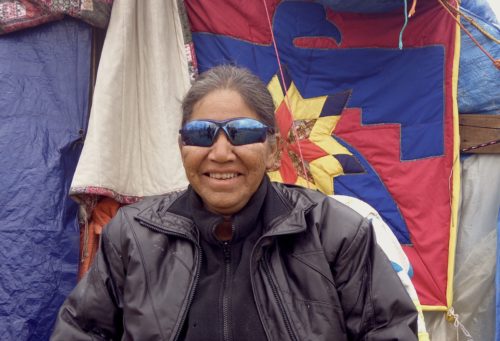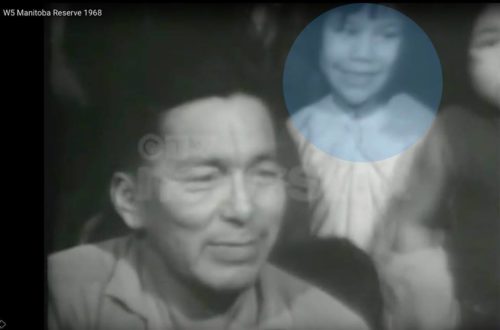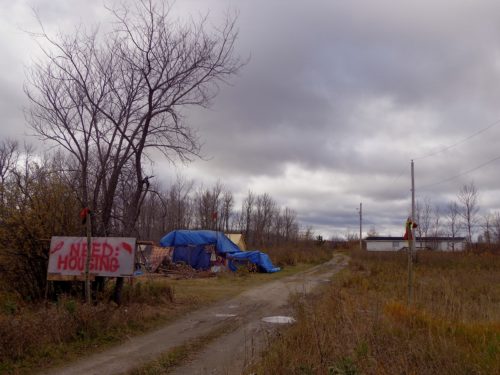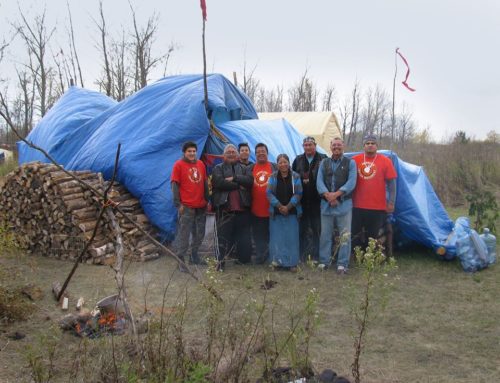[Today journalist and Canadian correspondent Dodie Graham McKay shares an interview with a Alma Kakikepinace, a woman who was protesting living conditions on Sagkeeng First Nation. If you enjoy articles like this, please consider donating to The Wild Hunt. We are now in the home stretch. You make it possible for us to continue to provide a platform for our communities’ important news. What better way to celebrate the October season: Donate to a news organization that supports your spiritual community. Donate to The Wild Hunt today.]
SAGKEENG FIRST NATION First Nation, MB – On Sept. 21, Alma Kakikepinace embarked on a hunger strike to protest the lack of safe and healthy housing in her community. In addition to not eating any solid food, she has set up a protest camp and moved into a tent on the land adjacent to the trailer that she once called home.

Alma Kakikepinace [Photo by D.G. McKay]
Kakikepinace is now waiting at her camp for Sagkeeng First Nation Chief Derrick Henderson to deliver the promised help. Delays and politics are long and complicated with any First Nations issues. Various levels of government and bureaucracy, from the federal Canadian government to the band chief and council, are involved.
These conditions are commonplace on many of Canada’s First Nations reservations, and the province of Manitoba has some of the worst conditions in the country. Government documents, obtained by The Canadian Press through Access-to-Information legislation show Manitoba has the second-highest percentage of First Nations people living in dilapidated housing in the country. According to a 2014 United Nations Human Development Index report, quality of life on Manitoba First Nations ranks the lowest in Canada.
The black mold in Kakikepinace’s trailer is a common problem in Sagkeeng. These shelters were not designed to withstand the climate. But they are cheap for the government to supply, and commonly used on First Nations land across the country. Kakikepinace explained how federal health inspectors visited her:
“My house was studied three times. And when the federal health representative came up, I said you know you have done this three times, why are you doing this, what’s the point, nothing has changed in four administrations. He told me ‘Every time we study your home, Sagkeeng gets a shot in the arm for mold repairs.’ So if I’ve been studied three times, why haven’t I been repaired at least once? This is typical of reservations all across Turtle Island. I can say whatever I want, it’s not a black eye to the chief and council; It’s a black eye in the way the government is held over the First Nation people.”
Kakikepinace lives on her ancestral land at Sagkeeng First Nation, located 125 KM (78 miles) north of Winnipeg, Manitoba. In 1871, her great-great grandfather was one of the chiefs who signed Treaty #1, the agreement between the First Nations people and the white settlers for the land of southern Manitoba. By 1968 the housing crisis was already out of control.
Kakiepinace’s father was speaking out publicly about the deplorable conditions at Sagkeeng and was featured on the national news program “W5,” describing how the government bought and then gave to his family a condemned 20’ X 16’ house. The newsreel shows Kakikepinace as a smiling six-year-old child in a white dress,with her parents and eight siblings, all crammed into the tiny house.

Sam Mann, father of Alma Kakikepinace, and six-year-old Alma [Screen shot from W5 expose, 1968]
She also has this special message for the leader of Canada: “Prime Minister Trudeau of Canada, Justin Trudeau – I need to speak to you, face to face. I have a message about the First Nation housing crisis. I need to speak it to your face. I trust in Justin Trudeau to receive this message, which was cut off by the mainstream media.”
Many people have come to her aid, offering moral, financial, and spiritual support. One such helper is Michelle McNeill, a Witch and activist from Winnipeg. “I first met Alma in June of 2013 at a Womyn’s Gathering of All Nations, spear-headed by the indigenous women who got the direction through a shake tent ceremony, with bones that were unearthed from an ancient ancestor on sacred land in the Whiteshell (a provincial park and heritage site). Alma officially became a clan mother at the end of that first retreat in 2013. In 2014, she returned to the 2nd Womyn’s Gathering of All Nations to continue to share her teachings and spiritual service. We bonded deeply at these gatherings as spiritual allies.”
In addition to being in regular contact with Kakikepinace for moral support, McNeill has been making the drive from Winnipeg to transport supplies and visitors to Sagkeeng. She also set up a funding campaign to raise money for additional supplies, such as firewood, tarps, and equipment to keep the camp running. She stresses that all of the money raised goes directly to this cause.

Kakikepinace’s camp, with mold-infested trailer in background [Photo by D. G. McKay]
The days of her hunger strike stretched into weeks, and no settlement was forthcoming.
As her protest progressed, Kakikepinace found herself moving into a softer, more spiritual, trance-like place. She was able to receive guidance and teachings from the Creator. It was then that she began referring to her protest as a spiritual fast to reflect this transition.
Other visitors to the camp included two provincial politicians, Members of Legislative Assembly (MLAs), Judy Klassen, MLA for Kewatinook, along with Dr. Jon Gerrard, MLA for River Heights and former Manitoba Liberal Party Leader. They promised to help carry her message to Ottawa, the capitol of Canada, and to Parliament.
By Oct. 5, and day 15 of her spiritual fast, Kakikepinace came to the conclusion that her beloved cat, Pootie, would need to find a new home. She could no longer care for him properly at the camp. She had rescued him from the local dump as a tiny kitten, but with the uncertainties she was facing, Kakikepinace felt that he deserved better. A post was made to the Facebook page for the camp on Pootie’s behalf. He now has a new home in Winnipeg.

Visitors from Standing Rock with Kakikepinace (centre) [Courtesy photo]
On Oct. 19 and Day 29 of her spiritual fast, Kakikepinace was midway through her interview with us when she received a text from Chief Derrick Henderson. He was offering to give her a cheque, to settle her claim for mold damage. This would enable her to purchase a shelter to get through the imminent winter. With temperatures going down to freezing at night, this could not have happened soon enough. Through an exchange of texts, witnessed by TWH, an understanding was made that the cheque would be forthcoming by early the following week, Oct 23 – 29.
Based on this information and in good faith, Kakikepinace broke her fast that evening. After 29 days without consuming anything except lemon water and tiny amounts of bone broth, an exhausted, cold, and drained Alma Kakikepinace was able to eat food again. She was determined to maintain the camp and sacred fire until the funds were transferred, and the new winter shelter arrived.
The following day, her spokesperson, helper and adopted brother, Robert Peters, posted the following to Facebook:
Alma’s health has taken a turn for the worse, with issues around ending her month-long fast. An ambulance was sent to the campsite two hours ago, but she has refused medical care. She is determined to hear from Chief Henderson the words “Your cheque is ready.” He has been promising this for over a week now (when he last visited her at the camp), and still only sends her text messages saying “I am working on it.
Things became very touch and go over the next few days. A nurse who had frequently visited her in the camp throughout the spiritual fast went to check on her and assess her physical state. Kakikepinace accepted traditional medicine. This worked to balance out her medical problems that appear to have been a cardiac episode.
As of Oct. 26, Kakikepinace has accepted delivery of an 18-foot trailer, which is being winterized with help from her friends. She will not leave her ancestral land and is committed to staying for the winter in the trailer, which is now located beside the protest camp. Her fight is not just to secure her own housing; her fight is to draw attention to the unacceptable housing that First Nations people across the country are forced to accept.
How far will she go? How long will she fight? In her own words, Kakikepinace said:
‘Until I die’ – it was not flippantly said. I am willing to give my life. Tired of the status quo, tired of a dark world where indifference has become the norm, tired of my tribe being left out and imprisoned in a world of imbalance. Harsh words? Harsh world, from my perspective. My truth, many people’s truth. I’m sure there are many people who could say this in the world and be there, living it. So not to be using all the baser emotions, fear based, you name it – but if all the nations rise together at this time, and topple the lie that became truth, and put it back into perspective, this change that needs to happen, is not on a physical plane, and I’m not afraid to sound like a nutty case when I say that, there are many, many people who can relate to what I’m saying
The protest camp has been open to visitors from all paths and cultures. Kakikepinace has served as an elder and mentor for many people, indigenous and non-indigenous alike, who want to learn and understand the traditional ways of the First People of Turtle Island. Her thoughts are quoted in the introduction to the Truth and Reconcilliation Commission’s final report that was published last year:
The healing is happening – the reconciliation…I feel that there’s some hope for us not just as Canadians, but for the world, because I know I’m not the only one. I know that Anishinaabe people across Canada, First Nations, are not the only ones. My brothers and sisters in New Zealand, Australia, Ireland – there’s different areas of the world where this type of stuff happened…I don’t see it happening in a year, but we can start making changes to laws and to education systems…so that we can move forward.
Michelle McNeill sees this as an opportunity for Witches, Pagans and practitioners of earth-based spirituality to stand together. She said: “We are stronger when we are able to rise up together united as people of the earth who are here to honor and protect the earth. We all practice earth-based spirituality and are united in our mutual reverence for the earth, elements, and cycles. I honestly believe we all hold pieces of a much larger puzzle and when we are open to healing and sharing with each other the puzzle pieces start to come other and the teaching of our ancestors become more potent and powerful.”

Michelle McNeill and Alma Kakikepinace [Courtesy photo]
As per the agreement, Kakikepinace took down the “Housing Needed” sign that had marked the gateway to her camp. The tents will be taken down by a volunteer work party on Saturday. However, this is just the end of the first chapter in the long road of advocacy on which Kakikepinace has embarked. She will not back down in her fight to make sure the others in her community in need of clean, safe, and healthy housing get help. She refers to these neighbours as “The 500,” as she estimates there are at least 500 homes in need of repair or replacement. Many of The 500 visited her camp to offer support when she needed it, and now she will return the favour.
Funds are still being accepted by McNeill at the GoFundMe page, and updates on the protest can be found on the Facebook page.
FINAL 6 days of The Wild Hunt Fall Fund Drive! Donate today.
The Wild Hunt is not responsible for links to external content.
To join a conversation on this post:
Visit our The Wild Hunt subreddit! Point your favorite browser to https://www.reddit.com/r/The_Wild_Hunt_News/, then click “JOIN”. Make sure to click the bell, too, to be notified of new articles posted to our subreddit.
Does Canada have anything resembling Habitat for Humanity? Maybe an organization like that can come and build proper homes for these folks.